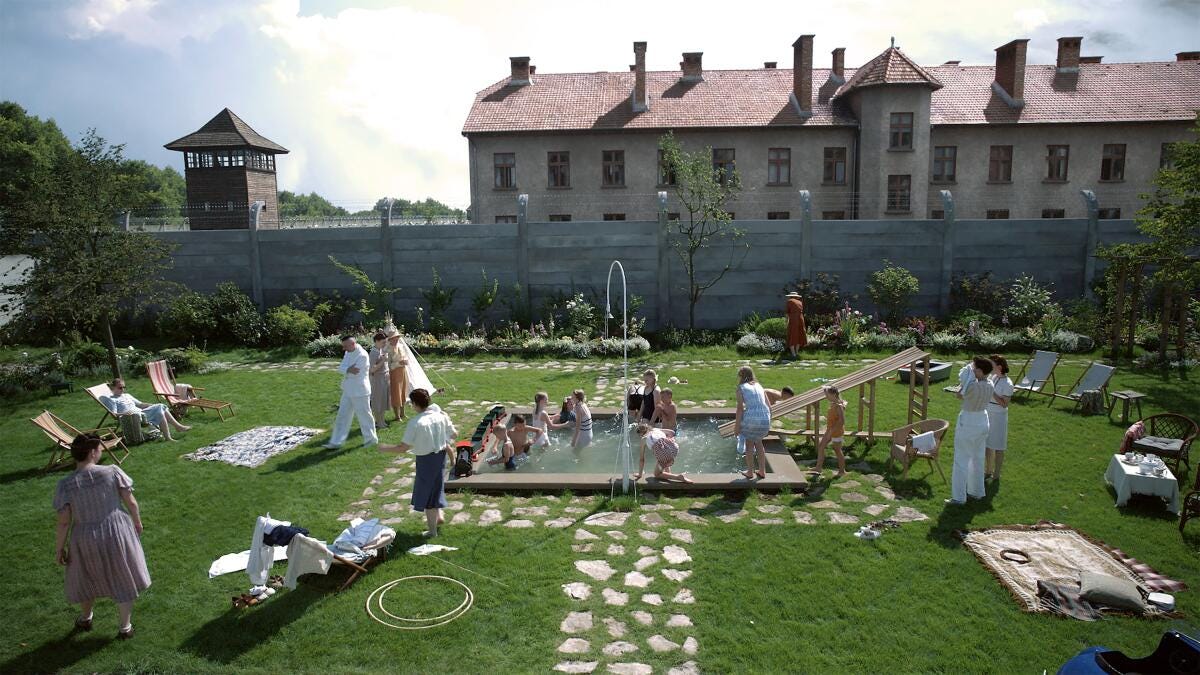The Zone of Interest
The best foreign language film I saw in 2023 is a bracing rumination on the banality of human oppression, as a German family lives blissfully next door to Auschwitz.
The have been plenty of movies, books or other storytelling about the banality of human oppression, but few have been as bracing as “The Zone of Interest.”
It tells the tale of a seemingly normal German family living on a beautiful small estate right next to the Auschwitz concentration camp. And when we say they are close, it means you can actually hear the screams of the dying and the staccato rifle fusillade of the firing line. Smoke from the furnaces sometimes wafts over the idyllic garden the mother has built for her children and family friends to enjoy.
At first glance, one is tempted to think this is an example of a fanciful filmmaking scenario. But no, Nazi commandant Rudolf Höss really did live in such a state with his wife and five children, overseeing the construction of a cruelly efficient operation for the murder and incineration of an estimated 1 million Jews and other unwanted. Toward the end of the war, Höss was reassigned to another command over his protest, and arranged for his family to remain at the house for the duration.
Christian Friedel and Sandra Hüller play Rudolph and his wife, Hedwig. What’s striking about their performances is the sheer everyday-ness of their lives and relationship. He is very focused on work, barely ever home or interacting with the children, while she sees herself as the commander of their little army unit, with the house as the headquarters.
He holds off on telling her about his transfer until the last minute, hoping to convince his superiors to change their minds based on the exemplary (to them) performance of Auschwitz under his hand. This leads to a major blow-up, in the middle of a party they are hosting for the other officers’ families, and we realize this strife could be taking place about any other subject, like the purchase of a new car or somebody’s in-laws coming for an extended stay on short notice.
Director Jonathan Glazer has a penchant for making discomfiting movies we experience like a nagging itch we just can’t scratch — “Sexy Best,” “Under the Skin.” He co-wrote the screenplay based on Martin Amis’ novel of the same name, though he boots all of the romantic triangle story and focuses on the cognitive dissonance of a family not only enjoying their lives at Auschwitz, but actually fighting to stay there.
It’s a very observational film, shot with an almost documentary-like lens roving over the saturated hues of the garden and lovingly appointed interiors of the house (cinematography by Łukasz Żal). Music (by Mica Levi) is similarly kept to a minimalist state with few big flourishes, more pulses of tone and intrusive noises.
From a plot standpoint, not a lot “happens” in the movie per se. It’s not like “Schindler’s List” or similar Holocaust stories that track a small group of people as they struggle to survive and persevere through the most horrific conditions imaginable. Indeed, we never actually see any of the concentration camp prisoners, though their clothes, shoes and other artifacts prove impossible to keep completely hidden.
Rudolph is cold and exacting in his work, but clearly loves his family on some level that might seem incongruous with his duties. Early on he takes his children to a river to swim and is repulsed when bodies from the camp float by. His protectiveness as a father is overshadowed by his anger at the slipshod procedures at the camp that allowed such a thing to happen — and evidence of their work to literally escape into the natural world.
Hüller gives the most compelling performance as Hedwig — much more so than in her other big film from last year, the over-lauded “Anatomy of a Fall.” She is so focused on protecting her family unit that she is utterly indifferent to the lives of humans being cast to the winds next door. She’s repulsive, but also oddly admirable.
“The Zone of Interest” is most powerful because of what it does not show. If it had relied on the usual horrifying depictions of Auschwitz, the audience would not be able to relate to the Hösses as human beings. That they were, as much as we’d like not to admit it.
By putting a face on them and depicting them as loving people toward each other, it makes their aversion to reality and cowardice all the more excruciating.





